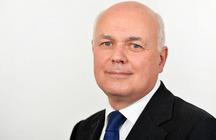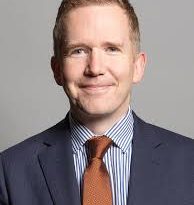Iain Duncan Smith – 2002 Speech to Students at Westminster Central Hall
The speech made by Iain Duncan Smith, the then Leader of the Opposition, in London on 5 February 2002.
It is a great pleasure for me to speak at the Westminster Day 2002 today and I am very grateful to you for inviting me. I know that my predecessor, William Hague, very much enjoyed coming to the Westminster Day and I look forward to doing what I can to support it in the future.
One of the reasons for that is the importance that I attach to encouraging people from all walks of life, whatever their background, to take an interest in politics and what their political leaders are actually doing. That applies just as much to people of my own generation as it does to people of your generation. It is important because the decisions that are made here in Westminster can have a huge impact on all our lives.
Questions about the future of our health service, about our education system, about the actions we will take to protect the state of the environment and to help those in our world less fortunate than ourselves, all of these will be decided through our political process.
Our world is moving at a bewildering pace. It is important that democratic institutions guarantee our security at such a time, while leaving us free to take advantage of the opportunities that change presents us.
But you cannot understand the power of politics without recognising first its place in modern life. At the very time when people are looking to politics for more and more answers, there has never been a more glaring disconnection between politicians and the people whom they are elected to represent.
Active participation in politics is now very much a minority pastime. General apathy with politics is now leading to dangerously low levels of participation in the democratic process itself.
Huge numbers of people cannot be bothered to vote. For them politics is just one big turn off.
That was demonstrated clearly at the General Election last year. At just 59 per cent we had the lowest turnout of voters at any Election since 1918 – and even then there were exceptional circumstances at work. Alarmingly for the state of our politics, more people stayed at home and didn’t vote on polling day than actually went out and voted for the party that won.
Among younger people the situation was more shocking. Just before the election an opinion poll for the BBC showed just 38 per cent of 18-24 year olds intending to vote, while among 25-34 year olds the figure was still only 45 per cent.
This isn’t a partisan point at all but there is a strong argument for saying that the real winner at the Election was apathy.
As a candidate, I met countless numbers of people who said to me that there was simply no point in voting. “They’re all the same – after your vote and then do nothing when they get in”. “Voting never changes anything. “It makes no difference to me”. They’re just in it for themselves”.
So it almost goes without saying that the image of politics and politicians, especially among younger people, is not a good one. It is borne out in opinion polls that regularly place politicians among the least trustworthy members of society.
There are numerous reasons for this. I don’t doubt that the various scandals that have hit all parties in recent years have tarnished the general image of politicians.
There is a widespread feeling that Parliament no longer matters – that it is marginal to events and not a place where people can get things done.
The language of politics is so often not the language of people and the priorities of politicians sometimes don’t appear to be the people’s priorities. As a result, political leaders seem to be remote arguing about obscure matters that have little or no relevance to people’s day-to-day experiences.
There is the growth of single-issue pressure groups that channel people’s energies and act as an outlet for their political grievances rather than political parties.
And, of course, there is the perfectly understandable fact that most people don’t sit around agonising about the day’s events at Westminster but simply want to get on with their lives.
These, then, are the problems. What are the solutions?
The first is that both politicians and voters must rise above the ritual cynicism that has become too ingrained in the conduct of politics.
Britain does not need to be a nation of full time political junkies. But we should recognise that among all the freedoms we have in the country the democratic right to vote in, and to throw out, the Government of the day is perhaps the most priceless.
Look at what is happening in places like Zimbabwe today, where free and fair elections are in peril. 20 years ago I served with the Army in Zimbabwe as we helped to help transform that country from white minority rule into a multiracial, multiparty state. Now, step-by-step it is becoming a dictatorship, unless we do something to stop it. That’s why democracy matters.
Think of the first fully democratic elections in South Africa after the end of apartheid, when people from the black townships got up at dawn, walked for miles and then queued for hours simply in order to exercise their new-found freedom to vote after years of political struggle and oppression. That’s why democracy matters.
When you see in Afghanistan today, women free to walk the streets by themselves, free to go to school and free to teach in those same schools because we lifted that country from the tyranny of the Taliban. That’s why democracy matters.
If we pretend otherwise, if we allow our own cynicism to obscure what a precious and hard-earned thing democracy is, then we cheapen not only ourselves we cheapen those who have lived without it for far too long.
We only have to look at our own country to see the power of democracy. Britain has become a very different place in the last 20 years in part because of the electoral successes of Margaret Thatcher, whether your parents agreed with her or voted for her.
The second thing we can do to revive our democratic culture, is to engineer an outbreak of honesty. You might think this a particularly difficult thing for a politician to achieve!
After all we live in an age of spin, soundbites and media manipulation, partly because we are led to believe that what looks and sounds good is more important than what is good.
This not only insults you as future voters, it does politicians a disservice too. I became involved in politics because I believed in certain things:
– that the more choice and more freedom people have the better their lives are;
– that the traditional rights and laws which shape the way we live our lives in Britain should be preserved for future generations;
– that governments don’t have all the answers and are at their worst when they pretend that they do.
These beliefs haven’t changed. If you ask me what it is that politicians do, I would say we are in the business of ‘practical idealism’. Politics is at its best and its most honest when it is driven by values, when the political debate is between the policies which flow from different principles.
These principles will differ from party to party. For the Conservatives it is about putting more trust in people and taking the world as we find it, rather than the way we would like it to be. That is where we start from when we seek to improve things.
Some of these improvements will be modest. It doesn’t make them any less worthwhile. Today my colleague Caroline Spelman is announcing an appeal launched with Islamic Relief to raise money for a mobile ambulance that will help treat landmine victims in Afghanistan. It is a practical step that will help thousands of victims. It is the sort of initiative that is replicated by countless thousands of people in this country up and down our country every day.
Trusting people means trusting their instincts, their desire to improve their neighbourhoods, to help out in their communities, to lend a hand to people on the other side of the world.
In our public services, it means giving more power to doctors and nurses and to teachers so that they can offer the quality of health care or education that they joined their respective professions to give. It is a simple vision rather than a grand design, but putting it into practice is far from easy. It means looking again at the way we run our hospitals and schools.
It is one of the reasons why my Conservative colleagues have spent so much time looking at the way other countries run their public services in France, Germany and Sweden to see what we can learn, to see what might be made to work here.
It means breaking away from old thinking, from the dogma and ideology that has characterised too much of our political debate on these issues for too long.
What really matters is that people are treated more quickly and to a higher standard in our hospitals; that more pupils have the chance to achieve the same qualifications and learn the same respect for themselves and for others that many of you here today take for granted.
This is the sharp end of politics. The democratic debate over the future of our hospitals and schools will shape the health care your parents and grandparents receive, it will also shape the education your children and grandchildren get when you are their age.
It is nothing less than a debate about the future direction of this country, about the future direction of your lives. If you want to be involved in that debate, now is the time.


